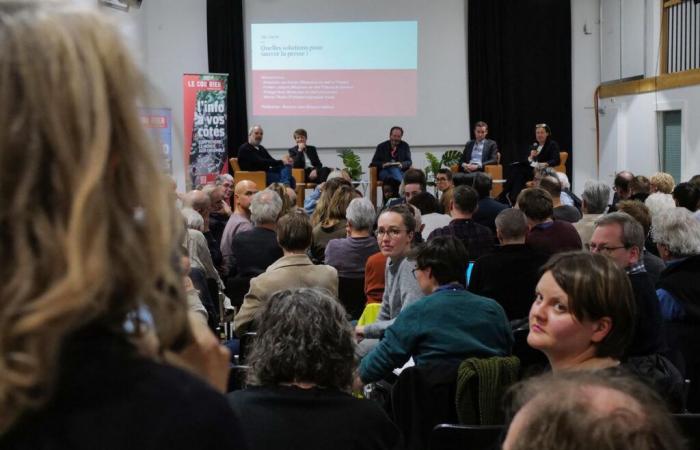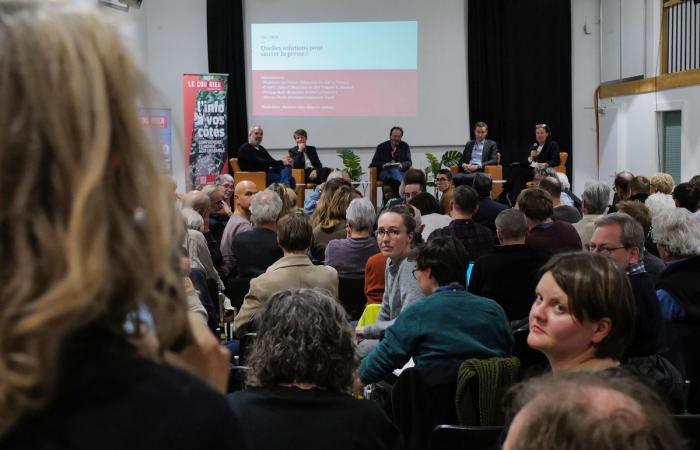Media crisis in Geneva –
“It’s now that it’s happening”
Two round tables were devoted on Wednesday to the future of the local press. Everyone agrees on the urgency of the situation.
Published today at 5:39 p.m.
The evening of discussion around the future of the local press took place at the Maison des associations, Wednesday November 13, 2024.
STEEVE IUNCKER GOMEZ
Subscribe now and enjoy the audio playback feature.
BotTalk
- “Le Courrier” organized an evening of discussion around the future of the press.
- Geneva daily newspapers are in financial difficulty.
- Should public money be invested in this particular sector?
And now what do we do? At the initiative of the “Courrier”, an evening of discussion took place on Wednesday at the Maison des associations, in Plainpalais, in order to outline solutions to save the local press. Although they have never had so many readers (adding those of the paper and digital newspapers), none of the three Geneva dailies are profitable.
This is the case with “Temps”, even if its editor-in-chief, Madeleine von Holzen, assured that the newspaper owned by the Aventinus Foundation was doing “well”. This is the case of “Mail”, who accumulates a deficit of 400,000 francs over the last two years. And this is the case of the “Tribune de Genève”, whose editor-in-chief leavingFrédéric Julliard, said that he “could not guarantee long-term sustainability” in a context that is changing so quickly.
Bern at the center of the game
Around the table, everyone agrees: journalists must do more to interest readers and win over new ones. Constantly demonstrate their “usefulness”. But is this enough in an economic sector where the product (information) is expensive to produce but brings little return (and even less on the web)? Reaching an agreement with GAFAM on neighboring rights could take years.
But time is running out. For the city’s administrative councilor Alfonso Gomez, public authorities must “invest” more. This is the only solution if Geneva intends to maintain “a serious and independent press”. In the absence of Nathalie Fontanet, who was invited but was unable to come, the environmentalist found himself a little alone during the debate. A few politicians were in the room, but they were almost exclusively left-wing.
Director of Médias Suisses, which brings together French-speaking publishers, Stéphane Estival recalls that a project to increase indirect aid from 30 to 45 million francs per year (notably postal distribution) is currently being processed in the federal parliament. “An oxygen buoy” – as long as it is voted for.
An “absolute political taboo”
And then there would be direct aid. An “absolute political taboo” in Switzerland, which Philippe Bach worked to demystify. Other countries, like the Scandinavians, are using it and the independence of the titles is not undermined, observes the editor-in-chief of “Courrier”. Sealing devices can be put in place. “In France, it is not Emmanuel Macron who says where the money goes,” he points out.
A public law foundation, like the Socialist Party proposesis it likely to generate support? Perhaps, but there is no question of helping a group that pays dividends. Which excludes Tamedia. “There is a contradiction in ignoring such an actor if we consider that the “Tribune” assumes a public service and must be supported,” notes Serge Gumy, boss of St-Paul Médias, in Fribourg.
A foundation could also help with the launch of a new media. Rocco Zacheo, future ex-cultural journalist at the “Tribune”, says that many of them dream about it in their corner, especially among ex-journalists.
Zurich, Lausanne and that’s it
“Talented journalists, who are not threatened by dismissal, choose to leave the profession. It’s a big problem,” recognizes Frédéric Julliard. About fifteen over the last five years in Geneva. In the audience, a speaker evokes a “hecatomb” within the cultural section of La Julie, which soon only has one collaborator.
Serge Gumy believes that it is up to the profession to provide “solutions”. When his group tried to obtain direct aid for the digital transition, it was refused. On the other hand, he managed to get the State of Friborg to participate in financing half of the subscription to the Keystone-ATS agency. Enough to free up funds to hire a journalist at “La Liberté”.
St-Paul counts as minority shareholders two local companies, the Banque Cantonale de Friborg and Groupe E, the equivalent of SIG in the canton. “The huge advantage is that the decision-making center remains in Fribourg,” reports Serge Gumy. He concedes small disadvantages, such as the fact that some readers classify them as “proeolian”.
If nothing is done at the end of the lake, the country will only tell its story “from Lausanne and Zurich”, anticipates Serge Gumy. “If the authorities want a Genevan narrative to persist, it’s now that it’s happening.”
“Latest news”
Want to stay on top of the news? “Tribune de Genève” offers you two meetings per day, directly in your email box. So you don’t miss anything that’s happening in your canton, in Switzerland or around the world.
Other newsletters
Log in
Did you find an error? Please report it to us.
9 comments







